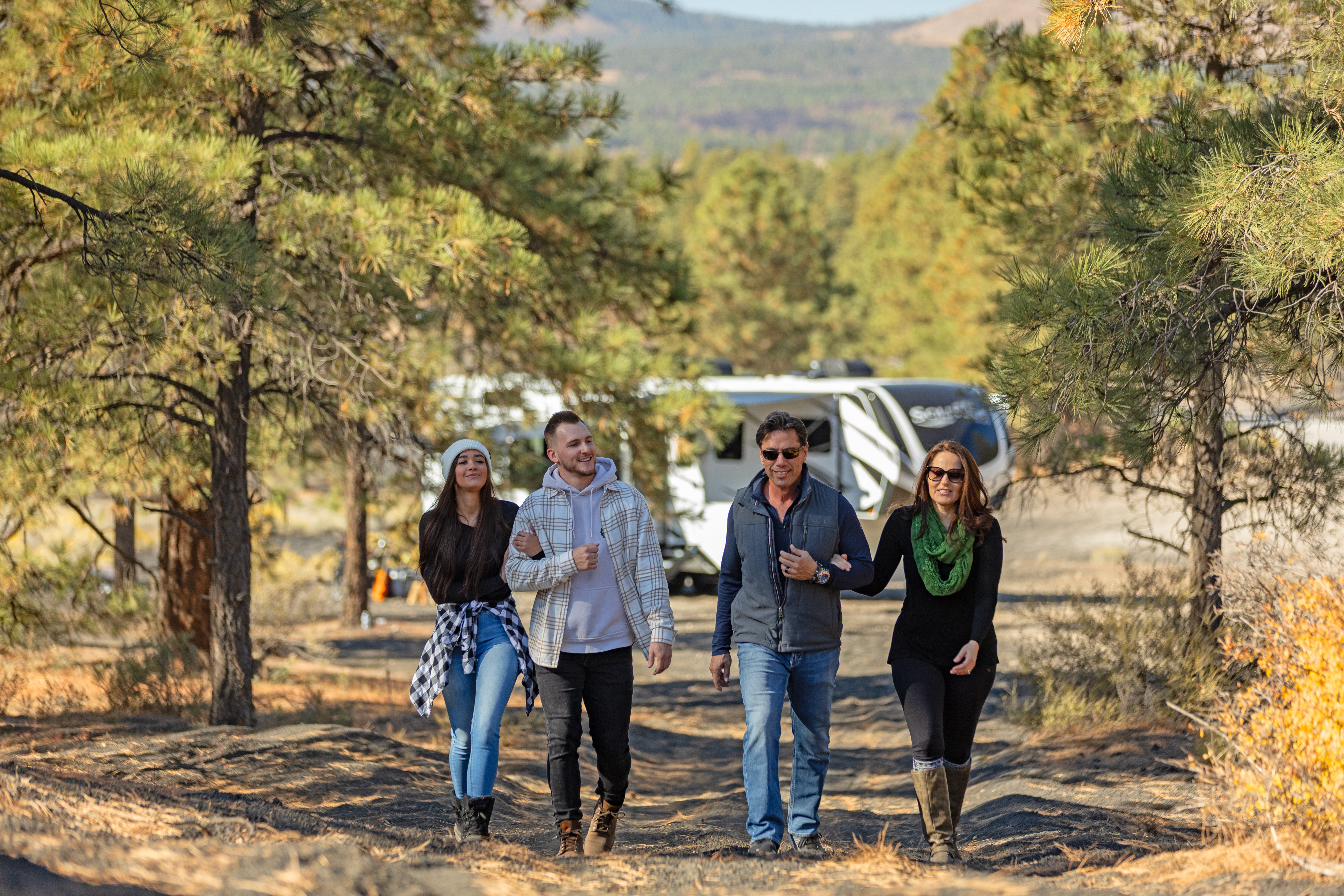LIVE
Top 10 Safety Tips for RV Camping with Dogs
For dog lovers, the only thing better than RV camping is RV camping with dogs. They bring endless joy whether you are home or on the road, and one of the perks of owning an RV is the ability to take them with you during your travels.
For many people, including your pooch in all your outdoor activities is one of the major appeals of RVing. That said, responsible dog owners know that traveling and camping with dogs does come with limitations and safeguards.
Dog owners should be discerning in when and how they involve their furry friends while RVing and recognize that “dog-friendly” doesn’t mean your dogs can do everything they want. Dog owners should take special precautions like brushing up on their training and preparing for the trip. Here are 10 tips to keep your four-legged companions safe while camping in your RV.
1. Don’t lock them up and leave.
If your initial impulse is to leave your dog locked up in your RV while you go hiking or do other activities, you may want to rethink bringing them altogether. Locking your dog up can increase their anxiety, and depending on the weather, your RV could become uncomfortably or even dangerously hot or cold.
It’s also possible that they could get into something they aren’t supposed to while you are away, like all those chocolate bars you were saving for s’mores.
When camping with a dog, it is best to plan your adventures so that you can bring them with you and you can keep an eye on them at all times.
2. Keep your dog on leash.
Perhaps the most important thing you can do to keep your dog safe while camping is to keep them on leash any time they are outside of your RV. Dogs are curious creatures and are bound to go sniffing somewhere they shouldn’t, whether it’s in a neighboring campsite or into the wild unsupervised. Beyond that dogs are technically predators; even a fluffy little pomeranian can trace its lineage back to wolves. This means that it is natural and instinctual for them to hunt, chase, and forage—which can be tremendously problematic when your dog encounters wildlife.
You never know how your pooch is going to react during these encounters, and you certainly don’t know how wildlife will react to your dog. Wild animals are very unpredictable, and both prey and predators alike can be extraordinarily dangerous. So, it is so crucial that you use a leash to protect you and your dog.
3. Let your dog sleep in the RV.
Never, under any circumstances, let your dog sleep outside of your RV. You need to make space for your dog to sleep inside.
Nighttime can be very dangerous while camping because nocturnal animals come out, and whether it is a raccoon, a mountain lion, or a skunk, you don’t want your dog to have to fend for itself while it is on a chain when these critters come into your camp.
4. Always have clean water.
As you sit outside in the sunlight or go on a hike with your pup, you’ll want to have plenty of clean water for them to drink and cool off.
Just like you, it’s important for dogs to stay hydrated. This becomes even more important when you are exercising or simply hanging out on a warm day. Once the temperature tops 80 degrees, heat stroke is a very real probability for your dog that, if not addressed, can cost your dog its life. Clean water and a cool place to lie down is critical to preventing your dog from getting overheated.
Keep a bowl of fresh water out at camp and bring a water bottle with a reservoir for drinking just for your dog when you leave. This will protect your pet from suffering from dehydration or a heat stroke.
If you plan on letting your dog drink from streams or lakes, ask your vet about any potential vaccinations your pet may need to fight off bacteria in the water. Also keep in mind that in the heat of summer some bodies of water will grow blue-green algae that can be fatal to your dog within hours. Do some research to determine whether or not your area is prone to this type of algae, when it is most common to occur, and how to identify it.
5. Bring your dog a life jacket.
If there is water nearby, such as a lake or river, protect your pup from drowning by bringing them a life jacket. This is more important when you are paddling around on a lake, boating, or fishing with your dog by your side than simply setting up your RV next to a body of water. Still, it’s best to be prepared for anything.
If your dog is not a strong swimmer and you know you’ll be doing a lot of water activities, you may consider investing in doggy swim lessons. Yes, this is a real thing. Don’t worry, we won’t tell your friends where you and your dog go on Saturday afternoons.
6. Keep treats on hand.
To keep your dog on its best behavior, be sure to bring plenty of treats to reward them for being good. This is good for rewarding them for coming when they are called, heeling while walking, and going potty outside.
You can also bring edible chew toys to keep them occupied if you ever have to leave them alone for any period of time.
Chances are that your dog is already well-trained, but it’s always good to reinforce this behavior when you are in a new environment—especially one with as many smells and distractions as the woods. Treats will keep your dog focused and eager to please.
7. Walk your dog around the perimeter.
Anytime you introduce your dog to an unfamiliar place, like a new campsite, it’s important to lead them around the perimeter. Dogs love new smells and letting them investigate as much as they can helps them get the need to explore out of their system. This means less leash-tugging and better behavior during your trip.
Another benefit to allowing your dog to sniff around the campsite is to familiarize them with their temporary home. That way, if they escape or get off leash, they will be able to find their way back to you.
8. Provide shade and shelter.
One perk to owning an RV is there is plenty of shade and shelter for both you and your dog. Just like you, dogs can get sunburned or overheated if they sit in the sun too long, and dog-safe sunscreen is hard to come by and annoying to apply. Giving them a shady place to rest will prevent them from burning or overheating.
Similarly, should it rain, it’s nice for your dog to have somewhere dry to hang out. Not only will this keep them cleaner during your camping trip, it will also protect them from getting pneumonia. Although, let’s face it, they are going to need a bath when you get home no matter what.
9. Keep them away from fire.
We’ve already established that dogs are curious. This often gets them into trouble. However, it can be extremely dangerous if they get curious about a campfire.
Fire, heat, or floating embers are all dangerous for your dog. So, when you gather around the campfire, practice proper fire safety and keep your pup a good distance away from the flames and don’t forget the leash.
10. Bring pet gear and supplies.
Last but not least, pack pet gear and supplies such as a pet first aid kit, a light-up collar, a jacket for the winter, or a cooling coat for the summer. A first aid kit will assist you with removing ticks (give your dog a rub-down every night to check for ticks) as well as treating any injuries that your pet may sustain at camp or on the trail. A light-up collar will help you keep track of your dog after the sun goes down.
Other supplies like bear bells, hiking booties, or an emergency rescue sling can protect your dog while you are away from home. Think ahead before your trip and consider what things your furry friend might need.
RV camping can be a great time for both your and your pooch if you come prepared. Once you do that, just remember to have fun and take pictures!












